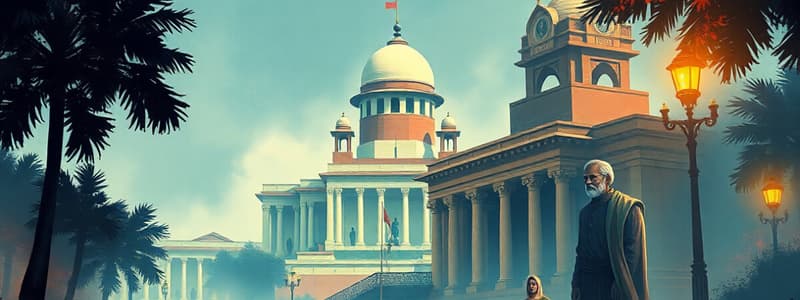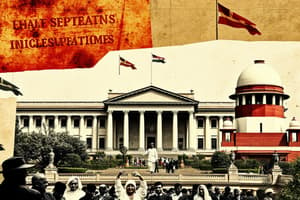Podcast
Questions and Answers
The Supreme Court of India can only be removed by the president at any time.
The Supreme Court of India can only be removed by the president at any time.
False (B)
The Supreme Court does not have original jurisdiction over cases brought by ordinary citizens.
The Supreme Court does not have original jurisdiction over cases brought by ordinary citizens.
False (B)
Judges of the Supreme Court must be Indian citizens and have served as advocates in a High Court for at least 10 years.
Judges of the Supreme Court must be Indian citizens and have served as advocates in a High Court for at least 10 years.
True (A)
The Supreme Court consists of the chief justice and five other judges.
The Supreme Court consists of the chief justice and five other judges.
The Supreme Court serves as a Court of Appeal for cases already dealt with by the High Court.
The Supreme Court serves as a Court of Appeal for cases already dealt with by the High Court.
The Supreme Court is located in Mumbai.
The Supreme Court is located in Mumbai.
The chief justice of India is appointed solely by the president without any advice.
The chief justice of India is appointed solely by the president without any advice.
Judges of the Supreme Court serve until they reach the age of 70.
Judges of the Supreme Court serve until they reach the age of 70.
The Supreme Court of India has the power to issue writs to protect an individual's fundamental rights.
The Supreme Court of India has the power to issue writs to protect an individual's fundamental rights.
Judges of the High Court can hold office until the age of 70.
Judges of the High Court can hold office until the age of 70.
A writ of habeas corpus is used to protect a person's freedom from illegal detention.
A writ of habeas corpus is used to protect a person's freedom from illegal detention.
The Supreme Court does not have the authority to declare laws void if they conflict with the Constitution of India.
The Supreme Court does not have the authority to declare laws void if they conflict with the Constitution of India.
The High Court is the final authority on the interpretation of laws in its respective state.
The High Court is the final authority on the interpretation of laws in its respective state.
The Supreme Court functions as a court of record, preserving a permanent record of its proceedings.
The Supreme Court functions as a court of record, preserving a permanent record of its proceedings.
A candidate for the office of a High Court judge must have been an advocate for at least 5 years.
A candidate for the office of a High Court judge must have been an advocate for at least 5 years.
The structure of subordinate courts varies greatly across different states in India.
The structure of subordinate courts varies greatly across different states in India.
The President of India can refer a bill to the Supreme Court before it is signed into law.
The President of India can refer a bill to the Supreme Court before it is signed into law.
Only the Supreme Court has the power to fine and imprison individuals for contempt.
Only the Supreme Court has the power to fine and imprison individuals for contempt.
Flashcards are hidden until you start studying
Study Notes
Judiciary Overview
- The judiciary is the third branch of government responsible for interpreting laws, punishing law violators, and protecting citizens' rights.
- Consists of three levels: Supreme Court, High Courts, and Subordinate Courts.
The Supreme Court
- Established as the highest court in India, located in Delhi; serves as a central government branch.
- Responsible for interpreting the Constitution and laws, with binding judgments.
Composition and Structure
- Comprised of the Chief Justice and 30 other judges.
- Chief Justice appointed by the president on the advice of the Council of Ministers.
- Other judges appointed by the president, based on recommendations from the Council of Ministers and Chief Justice.
Qualifications for Judges
- Must be an Indian citizen.
- Have served at least five years as a High Court judge or ten years as an advocate in a High Court.
- Recognized as a distinguished jurist by the president.
Terms of Office
- Judges serve until the age of 65; cannot be removed by the president unless impeached.
- Impeachment requires a two-thirds majority vote in both houses of Parliament on grounds of misbehavior or incapacity.
Powers and Functions
-
Jurisdictions include original, appellate, and advisory.
- Original jurisdiction: First hearings in disputes involving states or issues of public importance.
- Appellate jurisdiction: Reviews cases from High Courts upon appeal.
- Advisory jurisdiction: Advises the president on laws and can review bills before presidential assent.
-
Judicial review enables the Supreme Court to evaluate the constitutionality of laws and executive orders.
-
Operates as a court of record, maintaining permanent records of proceedings and judgments.
Issuing Writs
- Authorized to issue writs for legal actions:
- Habeas Corpus: Protects against illegal detention; mandates presentation of detained individuals in court.
- Mandamus: Directs public officials to perform their duties when they fail to do so.
High Court
- Heads the state-level judiciary, led by a Chief Justice and additional judges as appointed by the president.
- Judges must have held a judicial office or practiced as advocates for at least ten years.
- Can issue writs and oversee subordinate courts in the state.
Subordinate Courts
- Include District and Sessions Courts, Provincial Courts, and Nyaya Panchayats.
- Handle civil (e.g., property, contract disputes) and criminal cases (e.g., theft, murder).
- Governed by the High Court of each state, ensuring uniformity in structure and functions across the country.
Studying That Suits You
Use AI to generate personalized quizzes and flashcards to suit your learning preferences.




